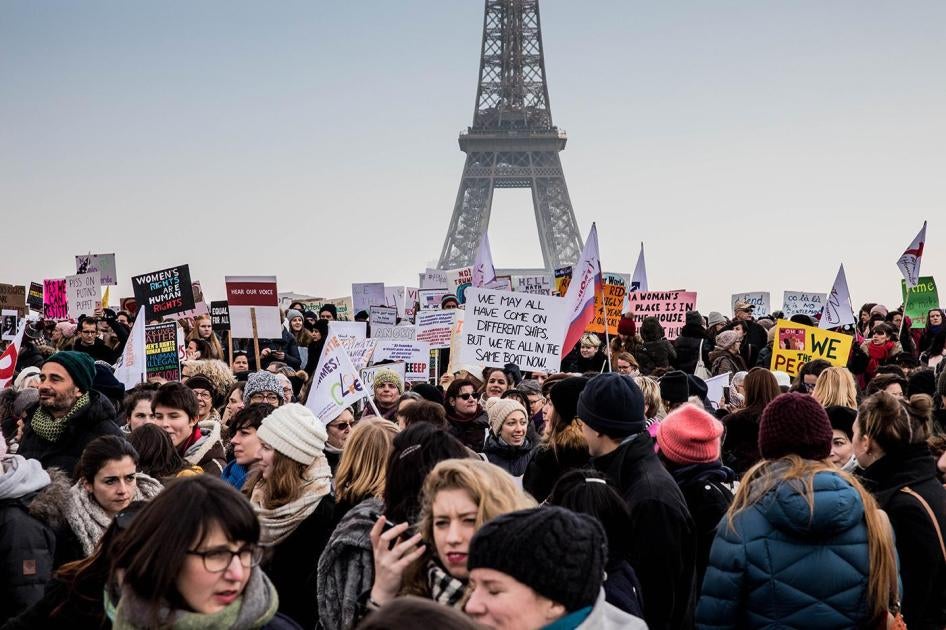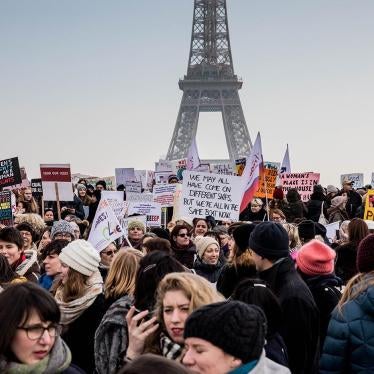The Helsinki summit between Presidents Vladimir Putin and Donald Trump epitomizes the ascendant cooperation between anti-rights populists and autocrats, of varying ideological bends, to disregard the foundations and values of a rules-based international community. Its fleeting significance was the mirror opposite of the most famous summit held in Helsinki, the 1975 meeting that ushered in détente between East and West and committed the 35 signatories, including the Soviet Union and its Warsaw Pact allies, to respect “human rights and fundamental freedoms.” The 1975 Helsinki Final Act proved to be a major breach in the Iron Curtain that led to the fall of the Soviet Union and the unification of Europe.
Yet today, in many of the 35 signatories and beyond, human rights are under sustained attack. Demagogues have built followings by demonizing minorities, attacking human rights principles, undermining democratic values, and fueling distrust of checks and balances. Whether in power or in the opposition, they are actively vilifying the human rights and fundamental freedoms enshrined in the Universal Declaration of Human Rights of 1948 and later international human rights treaties, as well as in national legislation. They are viciously trying to get the most out of what Emile Durkheim diagnosed as “the need, when a society suffers, to find someone to blame for its ills and on whom to exorcise its disappointments.” This is facile and reprehensible, as well as dangerous.
While there is no denying these are difficult times for human rights, results from a recent Ipsos Global Advisor opinion survey reveal an overall strong attachment to human rights in 28 countries surveyed. Although a snapshot in time and space, the overall results of the survey, conducted between May 25 and June 8, 2018, are heartening as they cover a number of countries where demagogues have tried to convince constituents that rights and freedoms are at best an inconvenience to governance and at worst a luxury that benefits the enemies of society.
Some 73 percent of 23,249 respondents worldwide held that people are born with human rights versus 14 percent who dispute that premise. Turkey (92 percent), Colombia and South Korea (87 percent) and China (85 percent) scored highest, perhaps surprisingly, and Belgium (48 percent), Poland (52 percent) and Japan (56 percent) lowest. Interestingly, the country-specific responses largely dismiss claims to cultural or regional relativity in rights. For example, in Malaysia, where recently returned Prime Minister Mohamad Mahathir first coined the term “Asian values” as a challenge to universal rights and norms, 77 percent of respondents held that human rights are inherent.
Moreover, 72 percent of respondents across the 28 countries believed that human rights lead to fairer societies, whereas only 8 percent disagreed. Overall, 78 percent of respondents agreed that it was important that laws enshrine human rights domestically and only 8 percent disagreed. When asked if human rights were meaningful to them personally, only 19 percent deemed them “meaningless,” with India (35 percent), Saudi Arabia (30 percent) and Brazil (28 percent) swelling the average.
About one third of respondents prioritized freedom of speech (32 percent) and right to life (31 percent) whereas one quarter cited right to liberty, equal treatment before the law and freedom from discrimination (26 percent) as well as freedom of thought and religion (25 percent), all of which are under sustained attack in many quarters as they are inherent to freer and fairer societies.
Key international human rights organizations also fared respectably with regard to impact in furthering human rights. Some 11 percent of respondents said the United Nations was doing a “very good job” and 41 percent a “fairly good job” against 22 percent who believed it made no difference. Only 8 percent stated it was doing a “fairly bad job” and 4 percent a “very bad job.”
International human rights nongovernmental organizations Amnesty International, Human Rights Watch and International Federation for Human Rights, fared slightly better with an average of 12 percent considering they are doing a “very good job,” 43 percent a “fairly good job” versus 18 percent responding that they are “making no difference,” 5 percent doing a “fairly bad good” and 2 percent doing a “very bad job.” Considering the increasingly hostile environment these organizations are facing, and numerous violations in multiple settings they are trying to deter, these results are encouraging.
Yet Some Important Cautionary Signs
One of the cautionary signs is that 65 percent of respondents are convinced that some people take unfair advantage of human rights, with even higher numbers in Colombia, Mexico, Peru and South Africa (78 percent) as well as Brazil (74 percent) and Chile (72 percent). A related cautionary sign is that 36 percent believe that the only people to benefit from human rights are criminals and terrorists. This is a common mantra used by politicians to undermine human rights, from UK Prime Minister Theresa May stating that “human rights laws get in the way” in fighting terrorism to presidential candidate Jair Bolsonaro in Brazil, who campaigns on “no human rights” for gangsters and kidnappers. There are significant regional variations, however, with respondents in the Global South harboring much stronger sentiments in that regard: Brazil (61 percent), Peru (60 percent), India (52 percent), Argentina (50 percent), Malaysia and Mexico (47 percent) and South Africa (46 percent).
Survey results also reflected the current adverse environment toward refugees and immigrants. Only 25 percent identified refugees among vulnerable groups currently requiring most protection, with numbers as low as 14 and 15 percent respectively in Hungary and Poland, maybe as a result of the aggressive demonizing of refugees by Prime Minister Viktor Orban of Hungary. Survey results for Australia offer the opposite scenario, as 34 percent of respondents identified refugees as a vulnerable category deserving protection, the highest of all countries surveyed, notwithstanding systematic efforts by the Australian government to dehumanize potential asylum seekers arriving by sea before public opinion.
Another vulnerable group that scored low were LGBT people with 22 percent saying they require the most protection, and a mere 11 percent in Russia, whose anti-gay “propaganda” law has been accompanied by stigma and violence. In the case of immigrants, numbers were even lower with only 19 percent of respondents identifying them as a particularly vulnerable group. China and Malaysia (8 percent), Hungary and Poland (9 percent), as well as Japan and Russia (10 percent) registered the lowest response rate. Unsurprisingly, children ranked first (55 percent), followed by people with disabilities (48 percent) and older people (45 percent).
Almost half of respondents in some countries, such as Malaysia and Saudi Arabia, said human rights were not a problem in their countries. In others, a majority wanted to draw attention to domestic abuses- 69 percent in Colombia, 60 percent in Mexico and South Africa, and 59 percent in the United States.
In addition, the survey seems to suggest that human rights education is needed in most countries. Many of the fundamental rights and freedoms enshrined in the Universal Declaration of Human Rights remained mostly unknown to respondents, although 10 percent claimed to “know a great deal” and 46 percent “a fair amount.”
These cautionary signs indicate that a fair assessment of global prospects for human rights should induce concern rather than surrender, a call to action rather than a cry of despair. The challenge is to seize the considerable opportunities that exist to mobilize the wider public and its still robust overall attachment to human rights to deter those who want to reverse hard-fought progress for human rights for all.
Countries Surveyed
The survey covered a number of countries where Human Rights Watch has documented serious violations of human rights and governments have tried to convince constituents that rights and freedoms are an inconvenience to governance. It included democracies, both liberal and illiberal, as well as repressive autocracies and monarchies, providing a rare snapshot of public perceptions to human rights in societies beyond those that are customarily considered to be “bastions” of human rights. While this may negatively skew the overall results, the data set behind the survey gives organizations like Human Rights Watch a rare if one-time quantitative glimpse of public attitudes in countries that are of major concern.
In Europe, the Fidesz government in Hungary stands out for its aggressive xenophobic rhetoric and leadership in opposing a coordinated response by the EU to manage refugee flows in accordance with international and EU obligations. In Poland, the Law and Justice government has used its parliamentary supermajority to weaken legal checks on its authority and actively undermine the independence of the judiciary with serious implications for human rights. In Italy, the recently installed coalition government by the League and the Five Star Movement is likely to condemn institutional checks and balances like the Constitutional Court and the president of the republic as it has upped the inflammatory rhetoric and doubled-down on its anti-immigrant campaign promises.
The survey also included China and Russia, where Presidents Xi Yinping and Vladimir Putin are presiding over the worst repression in a generation. In Russia, authorities have silenced critical media, viciously harassed political activists and peaceful protesters, systematically smeared independent groups and banned foreign organizations as “undesirable.” Moscow has also provided diplomatic cover for mass atrocity crimes committed in Syria, where hundreds of thousands of civilians have been killed in the now seven-year war.
In China, the government persists with its highly repressive rule especially in ethnic minority regions of Xinjiang and Tibet, has arbitrarily detained and prosecuted hundreds of activists and human rights lawyers and defenders, and instituted a slew a new internet laws that cast political activism and peaceful criticism as state security threats.
Since the 2016 coup attempt in Turkey, the state of emergency has allowed the government to rule by decree, dismiss over 150,000 civil servants and imprison over 64,000 more on terrorism charges. The 2017 referendum approved a tailor-made imperial executive for President Recep Tayyip Erdogan with weakened checks and balances.
In Saudi Arabia, notwithstanding façade reforms, Crown Prince Mohammed bin Sultan has plunged the kingdom into increased repression and a now-three-year war in Yemen rife with war crimes, thousands of civilian casualties and a worsening humanitarian and cholera crisis.
In India, the Bharatiya Janata Party government led by Prime Minister Narendra Modi has allowed pro-party vigilantes to commit violence against religious minorities, marginalized communities and critics of the government and security forces to commit extrajudicial killings, arbitrary arrests and torture. Authorities have failed to investigate attacks while promoting Hindu supremacy and ultra-nationalism, further encouraging violence and the sense of impunity.
In the United States, President Donald Trump has instituted harsh immigration rules repeatedly dehumanizing migrants, emboldened racist politics by making racially charged statements and equivocating on white nationalism, expressed disdain for independent media, and treated democratic allies and global human rights institutions with contempt while fawning over murderous autocrats.
The survey also covered other countries where government abuses may not be as dire in scale and scope but where populist anti-rights movements have gained considerable ground electorally and survey results most likely reflected shifting public attitudes. These include gains by the Front National in France and Alternative for Germany. In the United Kingdom, the Brexit campaign demonized the European Court of Human Rights and the EU Fundamental Charter of Human Rights, and the “Great Repeal Bill” proposed by the government could allow for secondary legislation to undercut rights currently guaranteed in the EU Charter.
In Latin America, the survey covered several countries with serious accountability gaps and continuing violence. In Colombia, for example, the 2016 peace agreement between the government and the Revolutionary Armed Forces of Colombia has allowed senior military and guerrilla commanders to escape meaningful accountability, and other armed groups not party to the agreement continue to commit abuses. In Brazil, against a backdrop of continuing violence against rural activists and indigenous people involved in land conflicts, security forces are likely to enjoy impunity with a new law that shields the armed forces from prosecution in civilian courts when members are accused of killing civilians during policing operations in urban favelas. In Mexico, the government has made very limited progress in prosecuting violence against journalists as well as past and present abuses by security forces in the course of efforts to combat organized crime. All three countries were also in the midst of general election campaigns.
Amidst these developments, the survey was conducted in Malaysia as opposition parties led by former Prime Minister Mohamad Mahathir won the May general elections, pledging to steer promising human rights reforms. The survey was also wrapping up in Spain as Prime Minister Mariano Rajoy resigned to avert a no-confidence vote in parliament and the opposition rallied behind the Socialist Party leader, Pedro Sánchez, to form a new government, which has announced encouraging policy shifts regarding refugees attempting to cross the Mediterranean. And in South Africa, the new government led by President Cyril Ramaphosa has created many expectations for supporting human rights, both domestically and regionally, inspired by the memory of Nelson Mandela.
Helsinki Redux
In the wake of the July 16 meeting between Putin and Trump, which showed the degree of their disregard for the foundations of a rule-based international community, there is no denying that the human rights and fundamental freedoms that eventually emerged from Helsinki in 1975 are in ever more danger.
Yet the battle is far from over. The survey results are encouraging in that, overall, broad swathes of the public, when reminded of the human rights principles at stake, recognize and prize the value of fairer and freer societies, the inherent rights we are endowed with upon birth, and the norms and laws that strengthen human rights domestically. The challenge is to mobilize this public attachment to human rights against the intolerance that feeds off fear and anger.
This can be done by more squarely addressing the legitimate concerns of segments of the population that have become indifferent to human rights, by appealing to wider values and broadening the rights movement to include potentially allied constituencies, as well as in more cleverly showcasing the largely empty solutions to complex problems that the demagogues are advancing.
Survey Methodology
This survey was entirely conceived and conducted by Ipsos Global Advisor. Human Rights Watch had no part in it as it was not a commissioned project. Ipsos generously provided the entire data sets behind the survey to Human Rights Watch pro bono.
In total, 23,249 interviews were conducted in June 2018 among adults ages 18-64 in the United States and Canada, and ages 16-64 in all other countries. The survey was conducted in 28 countries around the world via the Ipsos Online Panel system: Argentina, Australia, Belgium, Brazil, Canada, Chile, China, Colombia, France, Germany, Great Britain, Hungary, India, Italy, Japan, Malaysia, Mexico, Peru, Poland, Russia, Saudi Arabia, Serbia, South Africa, South Korea, Spain, Sweden, Turkey and the United States. Except for Belgium and Sweden, all other countries were referenced in Human Rights Watch’s 2018 Annual Report.
At least 1,000 people participated in each of the countries, except for Argentina, Belgium, Chile, Hungary, Malaysia, Mexico, Peru, Poland, Russia, Saudi Arabia, Serbia, South Africa, South Korea, Sweden and Turkey, where each sample was more than 500 people. The precision of these Ipsos polls is calculated using a credibility interval with a poll of 1,000 accurate to +/- 3.5 percentage points and of 500 accurate to +/- 5.0 percentage points.
Seventeen of the 28 countries surveyed generate nationally representative samples in their countries (Argentina, Australia, Belgium, Canada, France, Germany, Great Britain, Hungary, Italy, Japan, Poland, Serbia, South Korea, Spain, Sweden and the United States). In Brazil, Chile, China, Colombia, India, Malaysia, Mexico, Peru, Russia, Saudi Arabia, South Africa, and Turkey, the surveys produce a national sample that is more urban and educated, and with higher incomes than their fellow citizens, which is not nationally representative of the country. Data is weighted to match the profile of the population. For more information on the survey, please click here.








